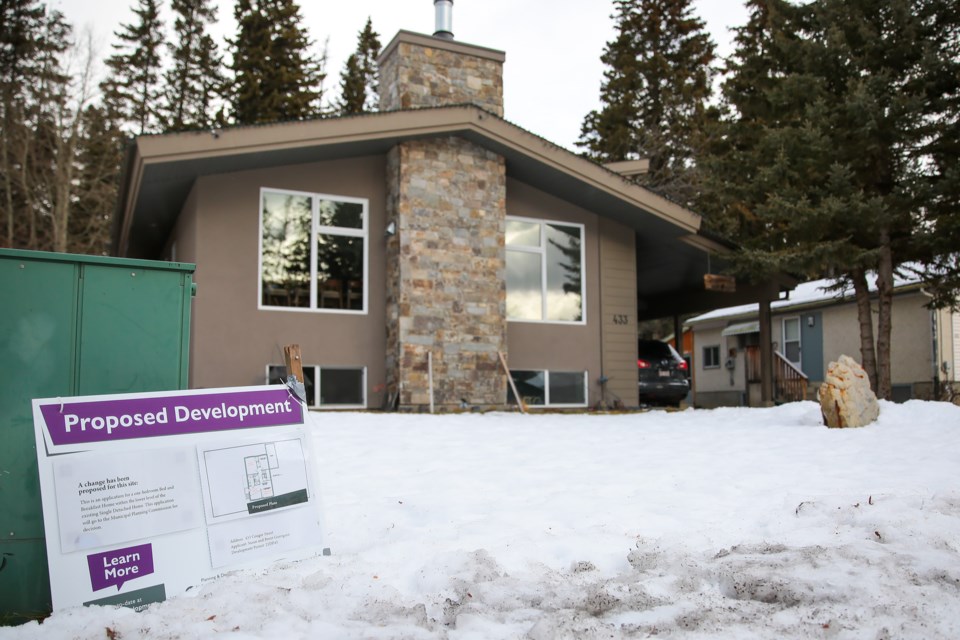BANFF – A new bed and breakfast home has been approved on Cougar Street, filling the quota for the land district after another B&B was shut down for illegally running more commercial rooms than allowed.
Banff’s Municipal Planning Commission (MPC) approved a development permit on Friday (Nov. 26) for a B&B home with one commercial accommodation unit at 433 Cougar St. in the RSC (Squirrel/Cougar) land-use district.
Emma Sanborn, development planner for the Town of Banff, said six B&B homes or inns have been approved previously for this district where a maximum of seven may be allocated.
“This district was previously full, but this recently became available this year as there was a bed and breakfast permit that was revoked due to compliance issues,” she said.
In May, the Development Appeal Board upheld a Town of Banff decision to revoke a permit for the Downtown Banff B&B at 338 Squirrel St., shutting down the operation for running more commercial rooms than legally allowed.
As a result, the available B&B home allocation within that district was advertised and a lottery was conducted as per the land use bylaw for the remaining B&B allocation because there were two applications.
The owners of the Downtown B&B applied again and had their application drawn in the lottery. However, in September, MPC turned down the application amid concerns the owners weren’t trusted to abide by the rules governing B&Bs in Banff.
In the event that a development permit is refused and the appeal procedure has been exhausted, Sanborn said the Town may then run another lottery to determine which remaining development permit application to consider.
“As only two applications were received, a second lottery draw was not required, and this second application has been brought forward for MPC’s consideration,” she said.
“If this application is approved, the RSC district will be full and no more applications will be considered for this district until an allocation becomes available within it.”
The applicants for the new B&B application on Cougar Street initially applied for two commercial accommodation units in the basement of their home; however, parking requirements under the land use bylaw meant only one commercial room could be considered.
Commissioner Stavros Karlos, who was a member of DAB when the municipality’s decision to revoke the permit for the Downtown B&B was upheld, wanted to confirm how B&Bs are enforced.
“When the issue came up with the other B&B in this district, it was interestingly enough similar in nature to this where there’s opportunities to add rooms because it’s being shoehorned into an existing space,” he said.
“What other mechanisms do we have other than neighbour complaints on enforcement of the second bedroom in the basement?”
Sanborn said the Town of Banff uses restrictive covenants registered on title and statutory declarations as the two legal tools to ensure applicants understand exactly what has been approved.
Based on council direction in 2014, she said the planning department also does proactive scans of websites such as Airbnb to determine how many bedrooms are being advertised compared to how many have been approved.
“As time permits and as our interest is piqued, we look into these ads,” she said, noting the department also relies on complaints to look into potential breaches of development permits.
Commissioner Leslie Taylor questioned MPC’s past practice when it came to a bylaw stipulation that commercial accommodation units located primarily below-grade or with limited access to natural light be discouraged.
“This is not primarily below-grade, it’s entirely below-grade, so what has been the past practice on that particular piece of the land use bylaw?” she said.
Sanborn said the B&B application includes photos of the lower level of the home, showing large windows providing natural light.
“The language and direction of that piece of the land use bylaw is interesting. It doesn’t say no bed and breakfast home shall be located below-grade, which would clearly tell an applicant do not apply for a B&B home, we will not consider a below-grade B&B,” he said.
“Typically, we’ve shown photos like we did today to MPC to colour that in your mind, to give you clarity about whether or not you believe natural light is being provided in the space or not, and decisions have been made from there.”
Darren Enns, the director of planning and development for the Town of Banff, said council had a robust discussion on wording in this section of the land use bylaw.
He said council intentionally adopted the word discouraged instead of prohibited to allow for cases for the development authority to make interpretations.
“I would also say after council makes that decision, that policy lives with the community and people like yourselves… the language is up to you to interpret,” said Enns.
Under Banff’s land use bylaw, there is a town-wide cap of 65 B&Bs. There are also limits to the number of B&Bs within each of the 11 land use districts where they are allowed.
B&B homes are a discretionary use in all land use districts in which they are allowed in town. MPC is the development approving authority for all discretionary uses of this type.




